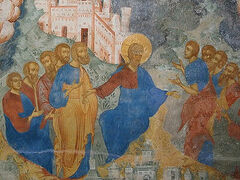Part 1: Paradise and Hell Are Already Here and Now. Part 1
 The Parable of the Wheat and the Tares
The Parable of the Wheat and the Tares
Faith in God is a deadly cross for human pride and a painful crucifixion for selfishness.
The Lord testified to this: Verily, verily, I say unto you, Except a corn of wheat fall into the ground and die, it abideth alone: but if it die, it bringeth forth much fruit. He that loveth his life shall lose it; and he that hateth his life in this world shall keep it unto life eternal (Jn. 12:24–25).
That is why it is so hard for us to come to believe in the Lord sincerely and wholeheartedly; or rather, it is absolutely impossible by our efforts alone, without grace and help from above.
To come to believe in Christ you first need to meet Him, by hearing and responding to His call, so that He Himself can touch your heart with His Spirit and kindle a gentle flickering of faith in it. As long as there has been no such touch, you in fact are not yet a believer. Your faith is not yet living, burning, or spiritualized. Either you have no faith or it has a superficial, formal, and worldly nature.1 Without faith quickened by the spirit you are still outside the fold of Christ,2 outside His Body, the Church.3
At the same time, outwardly you may seem to yourself and to others a believer, since you correspond to certain formal indicators. For example, you are baptized, know the basics of the Christian faith and attend church services. “But this is not enough,” as one poet said.4 Such people lack the most important thing—being inwardly filled with the Holy Spirit.5 One of His most precious gifts is sincere faith in the Lord.
Every person needs to take pains to ensure the presence in his soul of a living, gracious flickering of Christian faith, without which all our words and deeds become futile, worldly and vain, and our whole life loses its salvific meaning.
It is through the Lord’s kindling the flame of faith in the human heart that a grace-filled seed of paradisiacal life begins to dwell and grow in it, struggling through to the Light through the thorns of sinful passions.
From the moment you meet and convert to Christ, your intensely difficult spiritual work begins of self-improvement, of being transformed into the image and likeness of Jesus of Nazareth. The Lord Himself compared this work to cultivating a field diligently to reap a good and rich harvest.6
The preparation of the soil for sowing corresponds to your life before meeting Christ, when the “soil” of your soul is softened and humbled by trials, discoveries, sorrows, joys, meetings and separations, fascinations and disappointments, losses and acquisitions.
The tool that “digs up” and “loosens” the “soil” of your heart is the cross that we all have to bear. By bearing it or rejecting it you accumulate positive or negative experience, realizing your weakness and dependence on others, humbling yourself, growing wiser, and becoming more open to hearing the call of the Lord.
Sowing corresponds to meeting with Christ the Sower, Who sows into our hearts the seed of living faith. At first this seed is tiny; however, as it gradually grows, it embraces one’s entire being.7
The germination of wheat and its growth together with weeds corresponds to the stage of ascetic labor or spiritual warfare—the practice of implanting virtues and eradicating sinful passions. This stage can end in both defeat and victory for you.
In case of defeat in spiritual warfare the seeds and/or buds of faith are completely choked by the weeds of sinful passions, plunging your soul into the darkness of unbelief, despondency and eternal perdition.
If there is victory, the tares of sinful passions are completely eradicated and destroyed in your heart, which becomes a field covered with pure, virtuous wheat that has yielded a rich harvest. The whole person is filled with the grace of God, attains salvation and inherits Gospel beatitude.8
Reaping the harvest corresponds, firstly, to your final spiritual state at the end of your earthly life; secondly, to the partial judgment that takes place after your death; and thirdly, to the universal Last Judgment of all people by Christ. At the very end, the Lord will sum up our earthly lives and pronounce His righteous judgment based on the absolute knowledge of what is in our souls, and all the spiritual and worldly fruits that we have yielded, both good and evil.
As a result of God’s judgment, some will be vouchsafed a festive wedding banquet—that is, an everlasting blessed celebration in the Heavenly Kingdom, while others will be cast… into outer darkness: there will be weeping and gnashing of teeth (Mt. 25:30).
Thus, hell and Paradise begin and grow already here on earth, in the human hearts. God and the devil are in a battle for authority over these hearts. At the same time, each one of us consciously and voluntarily takes sides, “planting” and “cultivating” either hell or Paradise, or both alternately. Ultimately, every person brings himself to a state of either Paradise or hell here on earth, voluntarily joining the ranks of either the disciples or the enemies of Christ. In effect, by their seeds, shoots, stalks, and first fruits, Paradise and hell are here in earthly life, while in the afterlife are only the final, sublime fruits.
In this regard, , all the arguments by, on one hand, supporters of the theory of universal salvation,9 and on the other hand, by atheists, that the torments of hell are a manifestation of God’s cruelty, contrary to His absolute Love, are completely incorrect. The former conclude from this that hell is a temporary state and everyone, even the demons, will eventually be saved by our loving God; the latter conclude that Christianity is fundamentally contradictory, and if so, then there is no God, nor can there be.10 If there is an eternal hell, then there is no God of Love! That’s what they think. Therefore, “if we accept God, we should reject hell; if we accept hell, we should reject God.”
In reality, the presence of eternal torments in hell is a manifestation of God’s respect for human freedom, which, in turn, is a manifestation of His love. God respects and accepts our free choices, even if they are hostile to His will. If someone decides to live without God, tormenting himself with his own sins, God gives him the opportunity to do so (to use an Orthodox term, He allows it).11
Thus, the responsibility for the fact that someone by his own sins ended up in this godless and painful state in hell, and not in Paradise, lies on him alone. An unrepentant sinner brings himself to such a godless state—that is, hostile to God—in which the love of God becomes an unbearable source of suffering for him. For those possessed by malice, the most unpleasant, detestable and painful thing is goodness, just as for those possessed by darkness, worst of all is the light. He who hates everyone and everything perceives the light of God’s love as a burning and tormenting fire.
Descending the ladder of sinful passions, which are based on satanic pride, a sinner, with the help of evil spirits, naturally brings himself into a state of hatred and malice towards God, his neighbors, the world, and even himself—a state of utter loneliness, the deepest disappointment, hopeless despondency and the unwillingness to live.
According to the Holy Fathers, the seed or root of all passions is self-love, which consists of striving for sensual pleasures. The first passion that originates from self–love is gluttony. From gluttony comes the passion of the love of money; from them both—the passion of lust; from the three of them—the passion of vanity; from vanity comes pride; from vanity and pride comes anger, from anger comes sadness, and lastly, from sadness comes despondency.12
Sin begins with pleasure and the hope that this pleasure will only increase and intensify. It ends in anxiety, worries, doubts, fear, illnesses, suffering, total disappointment and everlasting perdition. A sinner who does not repent and does not reform is eventually left with nothing in his life.
The state of hell is that of cold, empty darkness, filled only with pangs of conscience, an awareness of a life lived meaninglessly and abominably, and an insatiable thirst for pleasure that can no longer be satiated, along with a strong fear of an eternity filled with suffering.
There is no need for physical torment in such a hell! It is so frightening and terrible. At the same time, it is entirely the work of human hands,13 the totality of your conscious and voluntary aspirations, beliefs, words and actions directed against God and your neighbors. There is absolutely no one to blame for it except yourself.
The opposite of this, by ascending the ladder of virtues based on Divine humility, with God’s help a believer, naturally attains a state of profound conciliar unity with God, with his neighbors, the world, and with himself in love, which fills his whole being with joy, gratitude and a sense of the infinite fullness of being and life.
This is a state of absolute enlightenment by the Light of Christ, in which you completely come to know God, others, the world, and yourself as you yourself are known by God.14 Your whole being becomes a sanctified temple of the Father, the Son and the Holy Spirit, filled with the grace of the Holy Trinity.15
According to the Holy Fathers, the seed or root of all virtues is humility, which opens the human heart to the grace of God, inviting into it Christ Himself—Who humbly stands at the door, knocking at it and waiting for us to open and invite Him to enter.16 First of all, abstinence originates from humility, from abstinence, chastity, from chastity and other virtues, patience, meekness and mercy, ad from them, love. And love fills you with infinite, grateful joy.17
So, by living with God on earth, being in communion with Him, in Paradise we simply attain the fullness of communion with God, bringing the Paradise of our souls to the infinity of Divine love. If we live only for ourselves on earth, for our selfish desires, then after death we find ourselves in the proud void of loneliness, bringing the hell of our souls to the infinity of satanic malice. We ourselves are the free creators of our eternity—either blissful or agonizing, either Heaven or hell.



